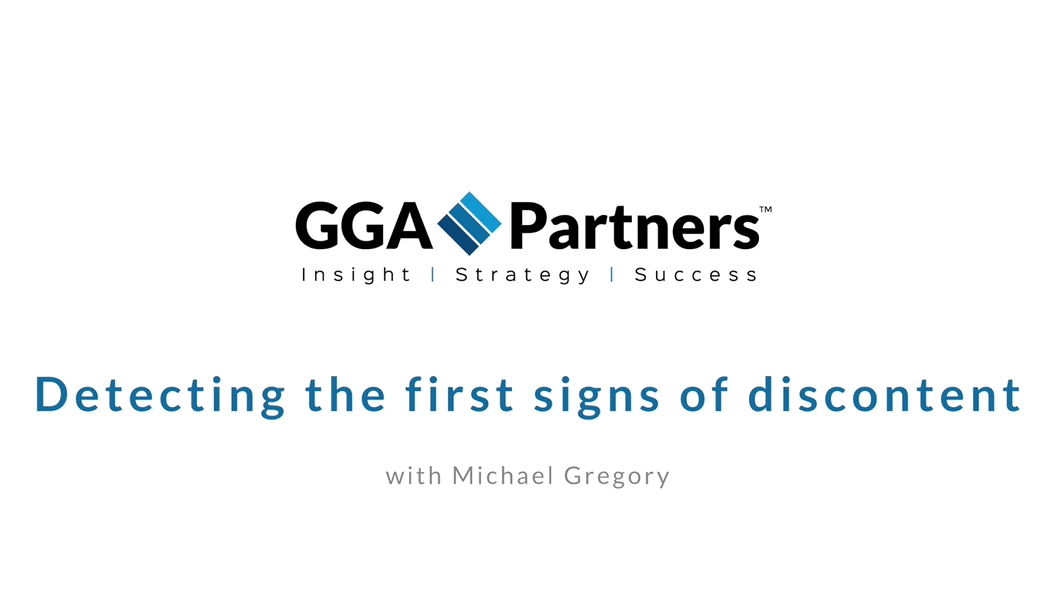When we were introduced to COVID-19 in March 2020, no one had any indication that ten months later the number of cases and its toll on society would continue to rise. The introduction of a vaccine is promising, but the road ahead remains filled with uncertainty as to when the next normal will arrive – and what shape that normal will adopt.
Since its inception, GGA Partners has traveled the globe working with private clubs, golf courses, investors, real estate developers, resorts, municipalities, and financial institutions. This has provided unique insight into the state of golf, private club, and leisure businesses from many different perspectives.
We have observed that even before the coronavirus pandemic, significant change was underway across the private club landscape. As we prepare for the “new normal” the thought leaders at GGA sat down to predict what they believe is coming in 2021 and beyond.
1. COVID-19 accelerates change already afoot in governance
According to Senior Partner Henry DeLozier, the change brought on by the pandemic is going to necessitate even more rapid change in governance, which GGA has seen clubs struggle with this past year.
“In corporate America, the concept of stakeholder capitalism was at the forefront in 2020 and that has transcended to the private club space,” commented DeLozier. “We’re hearing members across the private club spectrum questioning why they do not have a larger voice in their club and how board selections, as well as decisions, are being made.”
Private clubs that do not have current and effective governance will suffer from decreased member satisfaction and a constant churn of its membership base.
2. The capability to communicate effectively and efficiently will be key
Linda Dillenbeck, GGA’s director for the firm’s communications practice, stated that there continues to be a need to assist clubs in their efforts to communicate effectively and efficiently.
“It is basic human nature that people do not like change,” said Dillenbeck. “To minimize the disruption of pending changes, it is incumbent upon the management team and board of directors to clearly communicate the what, how, and why of their decisions then allow members to voice their opinions. This provides the level of two-way communication members are demanding.”
In addition to communications about club finances and capital improvements, clubs need to improve the use of the data they have collected to provide tailored communications to members. For example, notices about evolving restrictions on golf events should only be sent to those who play and those about activities for families with children don’t need to be sent to empty nesters.
Beyond member communications, clubs that will be successful in 2021 will be those which can retool and refine their external communications to ensure the message of what truly makes the club unique is presented clearly.
3. Greater work flexibility will impact club utilization in new and challenging ways
Report after report has trumpeted the tremendous increase in rounds played during the pandemic. According to GGA Director John Strawn, that is in large part due to work-from-home adaptations which are providing greater flexibility in how and when employees complete their daily tasks.
“People have more control over their work lives,” said Strawn. “Golf experienced fewer restrictions during the pandemic and that has brought out many new and fringe players leading to full tee sheets at both private and public golf courses.”
Full tee sheets are causing negative feedback from those who play more frequently as there is a belief that those not paying full dues are taking coveted tee times. To solve the problem, Strawn predicts clubs will need to revisit their strategies and ultimately their business models more frequently to ensure they are meeting this new and different demand effectively. Flexibility will be critical until the long-term impact on golf demand is better understood.
While clubs continue struggling to ensure fair and equitable access to the tee or courts while accommodating increased demand, Senior Associate Andrew Milne added that clubs should expect that best practice solutions may shift regarding reservations and tee sheet management to include lottery systems and Chelsea systems to ensure dissatisfaction among members is minimized. Understanding that new reservation management approaches may change the value proposition for members, a clear plan and message acknowledging this, and for measuring and adapting the approach as the future becomes clearer, will be important.
4. Clubs must better understand what women want from their club
According to the National Golf Foundation, while only one in five golfers are women, females represent a disproportionately higher percentage of beginners (31%).
Women ease into the game for a variety of reasons; to spend time with their family, to compete, to be outdoors, and to enjoy the support, community, and socialization. As these women age and consider joining a club, they will choose the clubs that shape programs, staff, activities, and offerings to blend the female competitive group with the group that is more interested in the social community.
“We’ve known for some time just how important the role of women and the family dynamic is regarding the decision on whether to join a private club,” commented GGA Director Murray Blair. “For clubs to succeed in 2021 and beyond, they will need to understand how women are impacting the decision-making process and implement the necessary adjustments to make them feel welcome, whether they play golf or not.”
5. Operational efficiencies gained during the pandemic will carry forward in 2021, and their challenges will too
Among the most remarkable takeaways from 2020 was the ability for clubs to adapt their operations and service offerings swiftly and effectively in the face of facility closures, variable human resource availability, and rapidly changing restrictions for public health and safety.
Contactless payments, varying tee time intervals, and pace dispersion tactics are pandemic-inspired efficiencies which GGA Associate Andrew Johnson predicts will continue.
Adding to the list, GGA Director Ben Hopkinson expects clubs will become more efficient at managing grab-and-go meals, take-out dining, and mobile ordering, following the best practices of companies like Uber Eats and DoorDash.
New ways of operating have also brought about new challenges, some of which will persist into 2021 and require even more new solutions to be generated at clubs and courses.
GGA Senior Associate Andrew Johnson expects that the increased costs associated with COVID-19 mandated protocols such as labor for sanitation and cleaning, as well as elevated maintenance expenses due to increased rounds, will remain through 2021.
Clubs that effectively determine what increased interest and golf participation means for facility accessibility, program creation, membership categories and associated privileges will find increased membership satisfaction and interest from new prospects.
6. The pandemic’s impact on club finances will remain uncertain, expect to see more measurement, flexibility, and experimentation
Despite successful adaptations in club operations and economic relief opportunities afforded by governments and municipalities, the full extent of the pandemic’s economic impact will remain varied across club types depending on business structures and market areas.
GGA Senior Manager Martin Tzankov, remains concerned about the financial position of many clubs and believes the brunt of the economic impact has yet to be seen.
“The reliance of clubs on dues increases and capital assessments has been particularly apparent this year and may have stretched the value proposition too far for some,” stated Tzankov. “2021 will show the clubs where a clear and present value proposition is being presented to members, who in turn, will continue to pay the cost of belonging.”
GGA Partner Derek Johnston believes there are clubs that will be able to increase pricing and sustain the increases in the long-term and there are clubs that will overshoot the mark. Johnston expressed concern that some clubs may move joining fees too high, too fast; golf businesses may move their green fees too high, too fast; and some may move away from tee sheet management practices too quickly.
“Nobody knows what’s coming. If clubs have experienced less attrition than in the past, it may be due to members being unwilling to give up their safe sanctuary, but when things begin to stabilize post-vaccine that may not persist,” he explained. “I believe that a portion of the historical attrition hasn’t been abated, just held back. There will be increased attrition over the next 12-24 months and there may not be the same demand there to replace those who leave, especially as other social and lifestyle pursuits become more widely available again.”
2021 will be a time for clubs to experiment. A measured, flexible approach to joining fees and dues will be a prudent approach this year.
7. A club’s success will in part be driven by its sum of parts in 2021
Craig Johnston, a partner and head of GGA’s transaction advisory practice, emphasized that the success of clubs during and following the pandemic will in part be driven by its sum of parts. Johnston explained “A private club may include a fitness center, retail store, several restaurants, a golf course, and a marina. The pandemic has impacted the utilization and thus success of all those ‘parts’ differently, and therefore the overall success of the club will largely be dependent on the club’s product or shall we say parts mix.”
“Every club is going to be different depending on its type of business and the operations which comprise it, the extent and variability of pandemic-related changes means that comparatives are going to need to be refined,” continued Johnston. “Clubs that understand and appreciate the challenges and successes of the various parts of their business will be in a better position to realign and optimize heading into the ‘new normal’.”
8. The movement of people and relocation of companies will reshape markets
Our news feeds have been full of stories about high-profile people and companies moving out of California into Texas, as well as the movement of bankers to Florida from New York. If looking at this as a trend, you might imagine seeing increased need and greater attrition among clubs in the California and New York markets and, conversely, excess demand for clubs in markets like Texas and Florida.
According to GGA Manager Alison Corner, it will be important for clubs to understand the movement of people – not just the movement away from major urban centers and into the suburbs, but also the movement of companies and the actual physical locations of corporations – because they may have drastic impacts to how certain club and leisure businesses perform over the next 5 – 10 years.
Clubs that are mindful of these relocation trends will help themselves to recognize and either seize new opportunities, or mitigate future risks.














